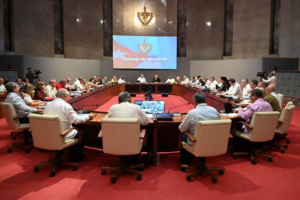 Havana, Cuba.- The Council of Ministers, with the presence of President Miguel Díaz-Canel, addressed several issues that affect the process to achieve macroeconomic stability in Cuba, it was learned on Monday.
Havana, Cuba.- The Council of Ministers, with the presence of President Miguel Díaz-Canel, addressed several issues that affect the process to achieve macroeconomic stability in Cuba, it was learned on Monday.
The head of State considered that the issues assessed at the meeting of the highest government body are “very important,” due to their impact on the macroeconomy and society.
Díaz-Canel referred to the economic complexities that Cuba is facing and cause delays in the regulated family basket; instability in the National Electric System; the inadequate relationship that is sometimes established between the state and non-state sectors; and the excessive increase in prices.
According to a report published in Granma newspaper, Díaz-Canel called to find solutions to the aforementioned problems and pointed out that many of them are related to bureaucracy and insufficient institutional control.
He also referred to the importance of becoming aware of the depth and scope of negative trends, as well as the way in which Government projections must be implemented to address them.
Díaz-Canel delved into the work priorities defined by the Communist Party of Cuba in order to strengthen unity; improve the ideological work, and ensure the execution of the economic measures proposed by the Government.
The president insisted on the need to “have more control over expenses” and give more participation to state companies when contracting services.
During the meeting of the Council of Ministers, a new set of measures associated with the Government’s projections was presented to correct distortions and boost the economy in 2024.
In this regard, First Deputy Minister of Economy and Planning Mildrey Granadillo explained that these measures aim to correct macroeconomic imbalances, increase the country’s foreign exchange earnings by different means and concepts, encourage domestic production and order the functioning of non-state forms of management.
She explained that among the main actions are adjusting the 2024 Plan and Budget to the conditions of the “war economy,” reducing the Budget items to reduce the fiscal deficit, define the requirements in the budgeted activity to use the approved Budget, and centralize the power of approval.
The new lines of work also include the establishment of a single pricing policy and the beginning of the process to prepare the Economy and State Budget Plan for 2025, based on the approval of the Global Model and the Government Directives conceived for that process.
During the meeting, it was learned that the behavior of the economy at the end of 2023 shows a decrease compared to the previous year, and from the estimate for the first half of 2024.
The highest government body agreed to submit the Budget Settlement report for analysis and approval by the National Assembly of People’s Power (Parliament), at its July session.